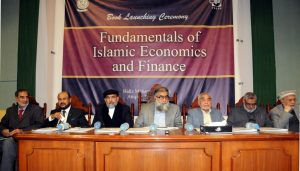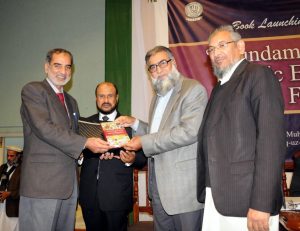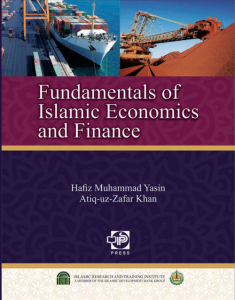 The launching ceremony of the book “Fundamentals of Islamic Economics & Finance” authored by Dr. Atiq uz Zafar, Director General, International Institute of Islamic Economics (IIIE) and Dr. Hafiz Muhammad Yasin, a Professor of Economics, was held at new campus of the university.
The launching ceremony of the book “Fundamentals of Islamic Economics & Finance” authored by Dr. Atiq uz Zafar, Director General, International Institute of Islamic Economics (IIIE) and Dr. Hafiz Muhammad Yasin, a Professor of Economics, was held at new campus of the university.
Authored by Hafiz Muhammad Yasin and Atiq-uz-Zafar Khan, Fundamentals of Islamic Economics and Finance was originally published by Islamic Research and Training Institute (IRTI) – a member of the Islamic Development Bank Group – in Jeddah, Kingdom of Saudi Arabia in 2016, and the low-priced edition of this pioneering work has now been published by IPS Press – the publishing arm of Institute of Policy Studies, Islamabad – under a reprint arrangement exclusively for sale in South Asia and South East Asia territory. Prof. Dr. Qibla Ayaz, Chairman, Council of Islamic Ideology (CII) was the Chief Guest while, Prof. Dr. Anis Ahmad, Vice Chancellor, Ripha International University, was the Guest of Honor on this occasion.
 Dr. Ayaz, Chairman (CII), urged policymakers in Pakistan to exploit huge potential offered by the discipline to foster economic development in the country. He added that presently evolving free market economic model was merely a new shape of capitalism and its study was only producing workers to serve the model. The framework offered by Islamic economics on the other hand offered much better prospects to cater for the issues that were left unaddressed by the prevailing paradigm.
Dr. Ayaz, Chairman (CII), urged policymakers in Pakistan to exploit huge potential offered by the discipline to foster economic development in the country. He added that presently evolving free market economic model was merely a new shape of capitalism and its study was only producing workers to serve the model. The framework offered by Islamic economics on the other hand offered much better prospects to cater for the issues that were left unaddressed by the prevailing paradigm.
Addressing to the participants of the book launching ceremony Prof. Dr. Muhammad Masoom Yasinzai, Rector, IIUI said that Islamic Economic System is the future of the World Economy, while the book “Fundamentals of Islamic Economics & Finance” is a unique work for those who want to know basis of Islamic Economic System. Congratulating both the authors of the book, Dr. Masoom added that Islamic Economics as a distinct discipline emerged in the last quarter of 20th century and the subject is now offered in many universities as part of the curriculum of economics at the undergraduate and graduate level. Dr. Yasin also talked about the need of establishing a Centre of Excellence for Islamic economics, stating that the subject had all the potential to offer solutions for contemporary economic problems. He added that few texts on introduction to Islamic Economics and Finance are available, whereas, this book is the first of its kind and nature.
 Prof. Dr. Ahmed Yousif Al-Draiweesh, President, IIUI also congratulated the authors of the book launch. On this occasion Dr. Al-Draiweesh said that research should be carried out on Islam’s Economic System, while Islamic Economic System leads to well being of the each and every individual of any society. He furthered that Islam elaborates how people can earn and spend money following “Halal” ways. Dr. Draiweesh also stressed that such books should be taught in modern universities and colleges as a robust economic model, offering alongside the Institute’s umbrella to support the research work in the said discipline.
Prof. Dr. Ahmed Yousif Al-Draiweesh, President, IIUI also congratulated the authors of the book launch. On this occasion Dr. Al-Draiweesh said that research should be carried out on Islam’s Economic System, while Islamic Economic System leads to well being of the each and every individual of any society. He furthered that Islam elaborates how people can earn and spend money following “Halal” ways. Dr. Draiweesh also stressed that such books should be taught in modern universities and colleges as a robust economic model, offering alongside the Institute’s umbrella to support the research work in the said discipline.
The book is published with the aim of satisfying the requirement for a standard, comprehensive textbook covering the necessary Islamic economics and finance topics in a simple presentation style, said Director General, Institute of Policy Studies, IPS, Dr. Khalid Rehman. He added that the textbook is designed for senior undergraduate students of Islamic economics and finance, and can also be useful for students of conventional economics theory.
Prof. Dr. Muhammad Tahir Mansoori, Member Shariah Advisory Board, SECP and former Vice President (HS&R), IIUI also congratulated authors on publishing valuable book which is based on Islamic Economic System. Dr. Atiq uz Zafar Khan and Dr. Hfiz Muhammad Yasin, authors of the book also spoke on the occasion. Those who attended the book launch ceremony include, Prof. Dr. Fahim Khan, Chairman, Ripha Center of Islamic Banking, Prof. Dr. Muhammad Tahir Khalily, Vice President (Academics), IIUI, Deans of the IIUI Faculties, Head of Departments, Senior Faculty members, Officials from Institute of Policy Studies and a large number of Students.

